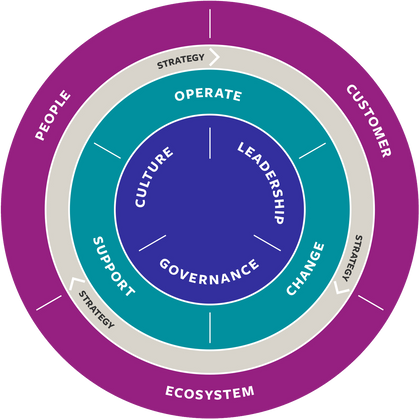
What is Agile?
Agile describes a way of working and refers to a collection of frameworks, principles, and practices designed to help teams deliver value more quickly, collaborate more effectively, and adapt to change with confidence.
It includes methodologies like Scrum, Kanban, and AgilePM v3, but the term also encapsulates a broader cultural shift in how we think about work.
It is a style of working where requirements and solutions evolve through collaboration between self-organising, cross-functional teams. It promotes adaptive planning, iterative development and incremental delivery. A timeboxed, iterative approach encourages rapid and flexible systemic response to change.
Want to know more? Read our Business Agility 101 article.
Agile describes a way of working originally defined in the Manifesto for Agile Software Development, that values:
- individuals and interactions over processes and tools
- working solutions over comprehensive documentation
- customer collaboration over contract negotiation
- responding to change over following a plan.
Rather than delivering everything at once, agile promoted the delivery of small, manageable pieces of value. By including regular feedback loops, it enabled continuous learning and course correction when necessary.
While agility has its roots in software delivery, it has evolved far beyond this to become an organisational competency. It combines being agile (mindset, culture, leadership), doing agile (adaptive operations and practices), and thinking agile (ecosystem and people) pivoting strategically to sustainably create value.


Agility nowadays is fundamentally about developing the organisational competency to deliver the right value faster, adapt to change, and work more collaboratively through iterative and incremental approaches with integrated learning.
It is crucial to distinguish between agile and agility: agile refers to the set of values, principles and frameworks like AgilePM, Scrum, Kanban, Disciplined Agile, LeSS, and SAFe designed to help teams work more effectively, while agility represents the broader organisational competence to adapt successfully to rapidly changing environments.
The organisation’s environment is changing more rapidly, more unpredictably. A common acronym used for this is VUCA (Volatility, Uncertainty, Complexity, and Ambiguity). Environmental, social, and economic disruptions, and of course technological advances like AI, create a pressing need for improvement, for adaptation.
Current organisation structures and ways of working, designed for predictable environments, often struggle to keep pace. However, organisations that embrace agility can respond quickly and effectively to opportunities and threats in their internal and external environments, turning change into opportunity while delivering sustainable value to customers, people, and the broader ecosystem.
An agile organisation can respond quickly and effectively to opportunities and threats found in its internal and external environments (be they commercial, legal, technological, social, moral or political).


Framework for Business Agility
The Framework for Business Agility has been created to help organisations survive and thrive in a volatile, uncertain, complex and ambiguous environment. It’s been shaped by the real-world experiences of Consortium members and other agile professionals.
The agility of each element will influence the way the organisation operates and evolves in response to the ever-changing needs of its customers and stakeholders.
Strengthen your Agile Culture
The Agile Culture Toolkit provides two powerful tools to help your organisation understand and improve its agile culture.
Nine Principles of Agile Leadership
Agile leadership is key to driving real agile business change. Discover how these principles can support agile transformation.
Towards an Agile Culture
In this white paper, view the results of our comprehensive research into agile culture and what it could mean for your organisation.
Membership
Become a member to access essential tools, expert insights, and a network of support through our communities and
specialised groups, empowering you to work smarter, lead confidently, and transform your project delivery.
